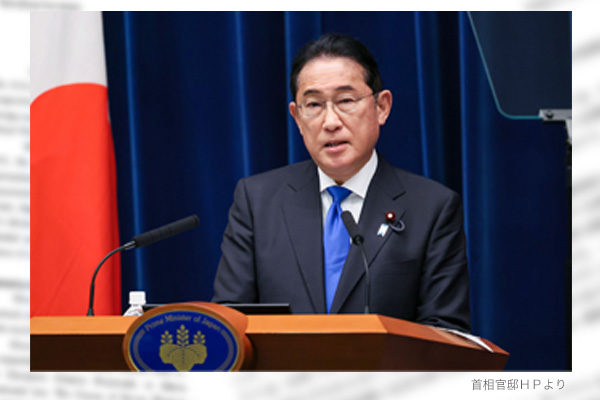Prime Minister Fumio Kishida has abandoned his bid for the ruling Liberal Democratic Party presidency after exploring the possibility of his reelection as the LDP leader. He has made not a few valuable achievements. Nevertheless, his give-up is probably a right decision. It is clear why Kishida has continued to suffer from low approval ratings without being able to regain public confidence.
Since his inauguration as prime minister in October 2021, Kishida has achieved landslide victories in both House of Representatives and House of Councillors elections, gaining a golden three-year period in which he could tackle constitutional amendment to make Japan a truly independent country, as well as the stabilization of imperial succession, without worrying about next national elections. However, he has wasted the three precious years that heaven has given him.
No progress made toward constitutional amendment or stable imperial succession
Japan is now in the midst of an unprecedented crisis. The United States, though still being the world’s strongest country, has lost its prestige as a great power. Whoever the next president is, the U.S. will be unable to come back to a strong and prestigious country as before. We need to be prepared that there will be no return to the days when the U.S. was responsible for global order, security, and universal values.
In the face of a once-in-a-century upheaval, Japan, the U.S., and Europe must prepare for China as the biggest threat. China, Russia, North Korea, and Iran are enhancing their cooperation to reshape the postwar global order. They incorporate the use of nuclear weapons into their strategies and seek to control both outer space and the deep sea. On top of that, China will seek other countries’ subordination to the values of the Chinese Communist Party. If we lose this struggle, we will face extreme hardship.
Historically, Japan allied with Baekje at the Battle of Baekgang, Korea, to fight against Tang-Silla coalition forces in 663 and defended itself from the Mongol invasion in the 13th century. When Christianity was introduced in the 16th century, Japan won a “religious war” with Iberian Peninsula countries. Japan also fought the first Sino-Japanese and Russo-Japanese Wars and the Greater East Asia War (aka Pacific War). Whenever an external crisis arose, Japan overcame it with military power and a talent for facing reality.
Mentally, Japan was determined to defend itself from foreign countries after the Battle of Baekgang. It compiled the Records of Ancient Matters (Kojiki) and the Chronicles of Japan (Nihon Shoki) to distinguish itself from the Sino-centric world. More than 1,300 years later, we are now facing a renewed Sino-centric world. Nevertheless, Japan for the first time in its history depends on a third country for the national security without demonstrating its own power. Under the constitution drafted by the General Headquarters of the Allied Powers (GHQ), Japan defines the Self-Defense Forces as not armed forces and put the SDF under the police law system that makes the legitimate use of military power difficult. Kishida continued to emphasize Japan’s Three Non-Nuclear Principles and its “exclusively defensive” posture.
On the other hand, Kishida vowed to the Japanese people that he would realize constitutional amendment within his term. He also repeatedly pledged to develop legislation to stabilize the succession to the Imperial Throne, which forms the foundation of Japan’s national identity. However, no progress has been made on both counts. His statements were merely designed to maintain his own base of support. It’s no surprise that conservatives who acknowledged his words as untrustworthy distanced themselves from him and did not come back to support him.
The next leader should make all-out efforts for national revival
Japan cannot overcome its current national crisis without constitutional amendment. However, Kishida has continued to shelve the most important challenge. Distracted by public opinion, he has focused only on immediate issues.
Kishida’s inability to recognize the seriousness of national existential crisis facing Japan is probably attributable to his lack of historical and national perspectives. The next leader to succeed Kishida should make all-out efforts to amend the constitution for the revival of Japan, based on the spirit of independence that runs through Japan’s history and on the values as a moral nation.
Yoshiko Sakurai is President, Japan Institute for National Fundamentals.


